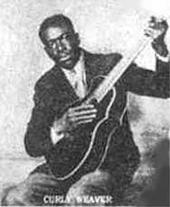Biographical SketchCurley James Weaver was born to Jim Weaver and Savannah Shepard of Newton County, Georgia on March 25, 1906. He grew up on the farm of a cousin, Tom Brown, at Liviston Chapel just outside Porterdale, Georgia. He later moved with his parents to Almon, a small community on the Atlanta side of Porterdale. The area was rich in its musical traditions. Named James after his father, he led a relatively privileged life as the son of a well-respected pianist and guitarist. Savannah was known as “Dip†to her friends and played piano in her church and knew enough guitar to teach the children of her friends Mary and Charlie Hicks. Their two sons which she taught along with her own son are better known as Barbecue Bob and Laughing Charlie Lincoln. Although the Hicks boys were a few years older than Curley, they managed to form a musical group that included harmonica player Eddie Mapp. Weaver had an easy disposition and made friends easily.Weaver also learned from other musicians besides his mother in the very musical Newton County and surrounding areas. It has been said that he learned from or was heavily influenced by Judd Smith, Nehemiah Smith, Blind Buddy Keith, Spencer Wright, Robert Hicks, and Blind Willie McTell. Weaver had a close friendship with the Hicks brothers and Eddie Mapp. When he was nineteen he moved to the Atlanta and really began his career. Some of his other musical friends included Buddy Moss, Buddy Keith, Harry Johnson, Johnnie Guthrie, Eddie Anthony and Blind Willie McTell. He was prized for abilities as an accompanist as well as a performer in his own right. He help a series of addresses in Atlanta but never forgot to visit family and friends. He moved around from girlfriend to girlfriend and supported himself as a laborer and by playing on the streets and at social events.In October of 1928, Barbecue Bob was able to get Weaver recorded with Columbia. He cut two sides under his own name. “No No Blues†is very much in the style of Barbecue Bob. He did not stay with Columbia but moved on to record with many different studios. In May of 1929 Weaver, Mapp, and Guy Lumpkin recorded in Long Island City, New York, for QRS. Mapp and Lumpkin recorded one solo each, backing each other. Mapp also backed Weaver on his side of his release.The deaths of Eddie Mapp and Bob Hicks along with the breakdown and subsequent incarceration of Laughing Charlie Lincoln effected Curley strongly. He remained to long-time associate of Willie McTell. He supplied backings for Ruth Wills and Lillie Mae and was a member of recording groups The Georgia Browns and The Georgia Cotton Pickers.Curley began to suffer eye problems in the late 1950s and moved back to be with relatives. By 1959 Weaver had completely lost sight in the one eye which has always been poor and the sight in the other was fast deteriorating. He died on September 20, 1962 in Almon while staying with his half-brother. He was buried in a quiet rural churchyard in Almon.Curley’s daughter Cora Mae Bryant was born in Newton County in 1906. She continues in her father’s tradition as a blues musician. "She's out spreading the word about her father and keeping his memory alive through her own music. Cora Mae is a living, walking blues legend."
Free Myspace Layouts by MyspaceLayoutSpy.com
Acoustic Guitar Myspace Layouts in Music Myspace Layouts
Myspace Surveys
